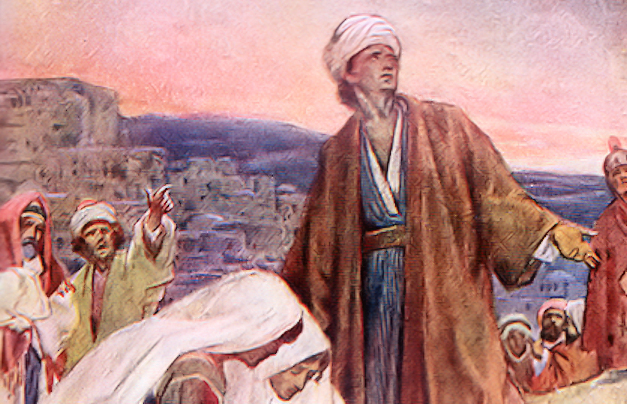“When Jesus therefore saw his mother, and the disciple standing by, whom he loved, he saith unto his mother, Woman, behold thy son! Then saith he to the disciple, Behold thy mother! And from that hour that disciple took her unto his own home,” (John 19:26-27).
The handful of family and friends that pursued the Lord to Mount Calvary in his time of need was hardly measurable compared to the crowds that pursued him when he was going about doing good. The multitudes followed while he provided them with bread and fish, but how soon did they flee when he himself cries out for a drink? They like his robes but not his rags; they like the prospect of a crown but not of a cross. Just days before, they had swarmed around him in that sunshine of Hosanna’s praise, and yet now they run for shelter in the storm of his crucifixion.
Out of all those multitudes, there remain but a few women and only one apostle now, here. And yet in the midst of unspeakable tortures and suffering and barely enough strength to stay alive, from the cross Christ turns his attention to care for these few.
When you examine this Giver, you wonder what could he have left to give? His garments are divided, his skin torn, his blood spilt. Every one of his closest friends, save for John, has deserted him. There are almost none left about him besides his loving mother and that beloved disciple. So with nothing more to bestow, he mutually gives them each other. “Woman, behold thy son; son behold thy mother,” (John 19:26).
Mary’s eyes weep, her legs tremble, her hands wring, her heart breaks, her soul bleeds drop for drop alongside her son’s body. No nail was driven into his hands that didn’t first pierce her heart. No thorns punctured the skin of his brow that don’t first cut through her bowels of affection. No blasphemy or insult reached his ears that did not first rend her soul with anguish and remorse, especially knowing she bore him to all this misery.
John’s heart, too, is shattered with the loss of his dearest Lord and closest companion. Nothing on earth or in heaven could ease the grief he felt over the loss of his Master’s life, nothing but his tenacious faith in the benefit of his death.
Mary and John. The one carried our Savior in her womb, the other leaned on his breast. And yet Mary is more blessed in that she carries his sayings in her heart than himself in her womb, and John in that he leaned on the Lord’s promises more than that he leaned on his breast. What did it benefit Saul that he was a prophet, or Judas that he was an apostle? For outward duty without inward grace – physical proximity without spiritual transformation – serves only to enhance and dis-excuse a man’s damnation. True and lasting benefit from knowing the Lord can only be found when you welcome him into your heart.
Contemplations:
- O my Lord and Savior, you call your flock a little one (Luke 12:32) and tell us that once the Shepherd is smitten (Zech. 13:7), the sheep will scatter. Here I see both of these demonstrated, and still how much care and concern you give these few sheep at the foot of your cross that day!
- I am one of your family too, Lord, though like Mephibosheth (2 Sam. 4:4), because of the fall I took from my mother Eve, I am lame. And yet you who provide so carefully for the birds of the air (Luke 12:24) and grass of the field, will not spare me, one of your own, your providence.
- Lord, help me apply my heart to the wisdom I find when I ingest the milk of your word, that I may grow thereby (1 Peter 2:2). And help me continue to realize that outward duties and service, no matter how glorious, are all for naught without inward grace. I cannot please you outwardly if my inner man is not daily growing in grace. So I will say as did the psalmist, “I will hide your word in my heart that I might not sin against you,” (Ps. 119:11). For I know that in doing so, I will stay by your side and at your feet, no matter how dark the world around me gets.
Further References for John 19:26-27:
Exod. 20:12; Matt. 15:4; Lev. 20:9; Eph. 6:2


